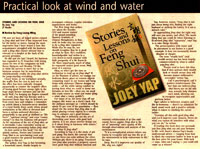STORIES AND LESSONS ON FENG SHUI
By Joey Yap
JY Books
Review by Fong Leong Ming

I’m sure we have all heard stories related to feng shui and how it has impacted lives for the better or worse. Among the most impressive that I have heard is how this acquaintance struggled with his business until a feng shui master advised him to relocate to a shoplot at the back of his present premises.
He did and the last I heard, his business has expanded to 25 branches with listing status for two of his companies on both Bursa Malaysia and Mesdaq. I’d like to think his success is more due to his business acumen but he nonetheless wholeheartedly credits the feng shui advice for jump-starting everything.
Closer home, at my workplace actually, the traffic flow for cars in and out of the office has been radically changed, purportedly to counter the negative effect of having good fortune sweep right in the huge main former entrance and out the back! Well, I’m keeping my fingers crossed!
All said, feng shui has become such a buzzword these days that its believers are from every race and religion. I remember an article about a business-savvy member of a royal family down south whose grand workstation at his office is elevated and faces a certain awkward direction – purportedly to tap good qi (defined as “life force”, “spiritual energy” and even “cosmic energy”) so that his business will prosper! As for variations of the art of feng shui, as is inevitable, I also remember seeing an advertisement promoting Indian feng shui!
So how useful is this book? For the plainly curious, Stories and Lessons on Feng Shui is an entertaining read and a good resource for general knowledge relating to this art.
The author, Joey yap, is fast becoming a household name, thanks largely to newspaper columns, regular television appearances and books.
The first thing that strikes one about the founder, CEO and master trainer of the grand-sounding Mastery Academy of Chinese Metaphysics, is that, well, he looks way too young to be a feng shui exponent. While that he may be, one should recognize that he is good at what he does. He’s confident, knowledgeable and writes in a very down-to-earth manner with little pomposity of a Mr. Know-It-All. More importantly, much of what he expounds makes good sense. Well, most of it anyway.
Okay, so who’s got the time or inclination to read up on feng shui? If, on the flimsiest of advice, we realign our bedroom doors, place or remove objects containing water in our homes and hang items with elaborate Chinese designs on walls – all the while taking comfort in having done what we could do boost our fortunes or love life – then yes, we need this crash course on wind and water (feng = wind, shui = water, geddit?)
For many of us, the term trips off our tongues like water on a duck’s back. For the plebians amongst us – which should be about 95 per cent of the population – first, dispel the notion that feng shui is all about placing certain objects in a certain way to enhance one’s good fortune.
“Feng shui is definitely not the art of decorating your home with good luck objects. It is not about interior design nor is it living in harmony with nature,” he emphasizes.
So what IS feng shui?
According to Yap, it is the study of yin and yang. You know, the concept that no one force can exist without the other. Without yin, there is no yang. Translated into feng shui practice, a property cannot have good feng shui without internal and external collaboration of qi (the said cosmic forces again). Feng shui is the art of “assessing” one’s quality of life through observations and analysis of the environment.
“It is the metaphysical science where one learns to recognize and tap into the qi of the environment to help endeavours in life,” he says.
Deep. But if it improves our quality of life, why not, right?
Yap, however, warns: “Feng shui is not just about being rich, finding the right husband and striking the lottery. It is not a miracle cure.”
So approaching feng shui the right way will save you money and effort. The worst thing that one could do when listening to ill-advised feng shui “exponents”, says Yap, is to take things literally.
The preoccupation with water and its placement in our homes is a good example. It does not necessarily denote disaster or danger.
The term “wealth luck” (and wealth sector) too has been heavily commercialized by what is called pop-feng shui.
“People tend to have this idea that if they activate their wealth luck or wealth sector, they will become instant millionaires overnight,” writes Yap.
Call it psychological, call it positive reinforcement. The fact that one believes feng shui forces are on his side may actually help sharpen one’s mind, allowing one to recognize opportunities and perform better.
Yap’s advice to believers, skeptics and the in-betweens – there’s no substitute for hard, smart work and a positive attitude when it comes to climbing the career ladder.
“Combine all this with good feng shui and you’ll improve your chances. Never let what you cannot do interfere with what you can do,” he writes.
If reading this book does not persuade you that feng shui can aid your fortunes in life, well, there’s always Yap’s handy motivational advice – ranging from how to climb the corporate ladder to how to get the best price for your house. With luck – oops, what am I saying – you could still come up a winner!








